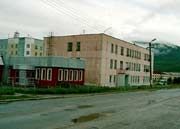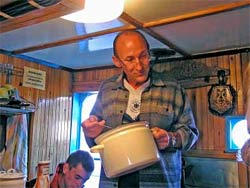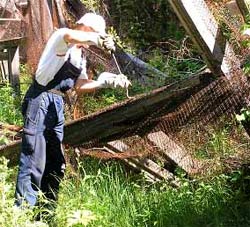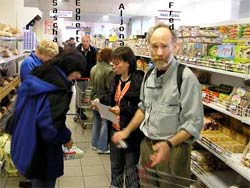Camp 2 - Davsha, Barguzinsky Biosphere Reserve - 1st - 14th July 2007
by Egbert Leibner

'Great Baikal Trail' - that sounds huge, adventurous and romantic. And that's what it was. Burt first things first ... it all began 28 years ago when I planned to study in Leningrad for the next 5 years where I lived together with my wife and our little daughter Katja in our first flat.
Times have changed but not our attitude to the Russian people. We wanted to get to know the new Russia and to also help. We wanted to find out if the new Russia is different from the Russia we got to know in Soviet times.
But, I'd like to say this right away, our memories of the life in Leningrad are, in spite of the lack of luxuries, still good ones. It was a school of hard knocks for our little family but, nevertheless, we had a very good time. And now we were asking ourselves: is it still there - the Russian soul, hospitality, open-heartedness, national pride?
An article in the newspaper about Baikalplan e.V. set the ball rolling. We then did Internet research and read some more newspaper articles. Should our return to Russia be that way? We had doubts. Does it have to be Siberia of all places? For almost 2 years we were mentally preparing for our journey to Russia and came to the conclusion that if we won't go now, straight to Siberia, we'll never get there! But which project amongst the more than 25 projects we should take part in? The project in the South Baikal or North Baikal region or in the nature reserve in the north-east?
We decided that the camp close to Irkutsk would be suitable. In the description it said that we would, besides building a new trail, also clean the trail. In travelogues of previous camp participants there was talk of collecting litter from the trails, and that's what I thought was 'clean the trail'. This turned out to be wrong. But before I even knew that I was wrong, I had decided that I didn't want to come all the way to Siberia to collect litter. Lake Baikal is the kind of remote place that you can't come back to that easily and also where no one can easily go to. So we decided to go into the Barguzinsky Biosphere Reserve - into the taiga where you can meet bears and sables and, unfortunately, midges, too. The village of Davsha, the former ranger and nature protection station, would be our home for 14 days.
 In December 2006 we ended the psychological preparation and really wanted to go to Siberia. Our relatives and friends just said: "You must be crazy" or "Terrific! I'd like to do that, too, but my husband/wife .... ." Everybody had a different opinion. In January/February 2007 we started to regularly e-mail Baikalplan e.V. in Dresden (located in the East of Germany), the BBT (Big Baikal Trail) office in Irkutsk and the GBT (Great Baikal Trail) office in the USA for preparing the journey. Up to the end of the journey, and even still after it, they always took care of our problems and requests - the work of the BBT team in Irkutsk was exemplary, although it was rather improvised. They helped us get the air and train tickets, they picked us up at the airport and train station and made sure that we felt comfortable when being in Russia.
In December 2006 we ended the psychological preparation and really wanted to go to Siberia. Our relatives and friends just said: "You must be crazy" or "Terrific! I'd like to do that, too, but my husband/wife .... ." Everybody had a different opinion. In January/February 2007 we started to regularly e-mail Baikalplan e.V. in Dresden (located in the East of Germany), the BBT (Big Baikal Trail) office in Irkutsk and the GBT (Great Baikal Trail) office in the USA for preparing the journey. Up to the end of the journey, and even still after it, they always took care of our problems and requests - the work of the BBT team in Irkutsk was exemplary, although it was rather improvised. They helped us get the air and train tickets, they picked us up at the airport and train station and made sure that we felt comfortable when being in Russia.
But now to the journey itself:
The flight from Berlin to Moscow on Air Berlin (we booked via the Internet) was no problem. On the flight from Moscow to Irkutsk on S7 (formerly Siberian Airlines) we had mixed emotions at the beginning but everything went fine and we were satisfied when getting off the plane. The green plane was reflected in the brand new terminal building. Amazing! We got to the terminal building via bus transfer. When getting off the bus we were standing in front of a shack, 15m x 15m (49ft x 49ft), where information signs of all types had been pasted up or nailed to it. We were stumped. About 250 people flocked in a civilized manner through the little wooden door into the terminal building and baggage claim area that were still in use. We took a look at the baggage carousel and finally understood the importance of wrapping our baggage in protective foil in Moscow (170 roubles). The baggage carousel (I just call it that way because with its diameter of 4m/13ft it was turning around like a carousel although it didn't correspond to our picture of baggage carousels at all) had a capacity of 15 suitcases. However, it seemed to be robust and hand forged. Strange but true: Everyone received their luggage undamaged and comparatively fast. No one was complaining and everything went' 'normalno' according to Russian standards.
We immediately ripped the foil off our rucksacks, put the rucksacks on our backs and just wanted to leave the crowded building when a little energetic woman appeared and said: "Your luggage receipt, please!" Holy sh*t! They´ve never wanted to see my luggage receipt before! I took the foil out of the waste bin and hoped that everything was still there. We were lucky: We found everything and could pass into the next room. Now, we were in Siberia, and in front of us a lot of pick-up persons holding signs. In an instant, we saw the sign with 'Egbert+Simone' on it that was held by Julia and her friend, two students from Irkutsk, as we found out later. They hailed a 'marshrutka' (small bus) for us (the tickets are very cheap) and together we went to the BBT office. Our first impression of public transport in Russia: Nothing has changed within the last 28 years. In Germany, such a van wouldn't even appear on the streets - it would just be scrapped - and the driver wouldn't let 10 people in when having only 8 seats available. In Russia, people think differently. There's room enough in the smallest hut and as long as a car moves it doesn't have to be certified by a vehicle inspection authority. Within the next days of the journey we stood by the opinion that, in Russia, a vehicle just has to fulfil its function but doesn't have to meet specific standards (we hoped this didn't apply to the aeroplane home). We as ex-citizens of the former German Democratic Republic (the former socialist state in East Germany occupied by Soviet troops after World War II existing from 1949 until 1990) got used to the scarce economy. We learnt how to improvise and therefore achieved the impossible. In present Russia there's still a scarce economy so that improvising has remained (we don't want to talk about the nouveaux riches because getting to know them was not our aim).
 In Irkutsk it was raining continuously and our attempts to make a city tour fell through. Until the train's departure, we spent our time in the BBT office where we met Fred from the USA, Sasha - our team leader, Tanya - the interpreter and person responsible for the project preparation and Tom from Baikalplan e.V. in Dresden amongst others.
In Irkutsk it was raining continuously and our attempts to make a city tour fell through. Until the train's departure, we spent our time in the BBT office where we met Fred from the USA, Sasha - our team leader, Tanya - the interpreter and person responsible for the project preparation and Tom from Baikalplan e.V. in Dresden amongst others.
With the constant coming and going of people, the constant tea drinking and the talking amidst all the chaos that had emerged from the office move, we couldn't really imagine that the project would be carried out or if so that someone would seriously take care of it. We had first doubts which disappeared the minute they arose. The continuous rain shouldn't spoil our mood. After all, it was the reason that we were stuck in the office.
Since we couldn't change euros into roubles in Germany and we forgot to do this in Moscow we changed them in Irkutsk. We strode through the rain with Tanya to get money cashpoint and felt so relieved. Then we recognized that we didn't have the air tickets from Severobaikalsk to Irkutsk yet. Tanya accompanied us again. In Germany we asked her to buy train tickets from Irkutsk to Severobaikalsk for us - and yes, Tanya did that for us, too. Like a fairy godmother she was always there for us although she was only 20 years old. Finally, the wait was over. Together with Fred and Sasha we went by tram to the train station and thereby crossed the Angara River which is very huge in comparison with the River Elbe that flows through Dresden (Eastern Germany).
It seems to me as if I know this tram. In Leningrad there were the same trams, in times of great Soviet power and in present times they still exist - and still move! At the train station there are numerous kiosks. On the recommendation of Sasha we bought some provisions like bread and salami - you never know!
The adventure on the Trans-Siberian and Baikal-Amur (BAM) railroads could begin: 34 hours, 2 nights through Siberia from Irkutsk to Severobaikalsk, 1755km (1090 miles) instead of 600km (373 miles) linear distance. Two young prospective students at the Irkutsk State Technical University were sitting in our compartment having dinner. They invited us to join them. For the next 34 hours we had open-minded people we could talk with. What we found out was that the 17-year-old girls, of course, dream about a life in the big, wide world, about working in a foreign country but, nevertheless, they have both feet firmly on the ground. They want to complete their studies successfully, they love their parents and are proud of them and their simple work, they love to come back home to their parents and their town Severobaikalsk.
 Travelling by train was very relaxing compared to the flight where the seats were really narrow. Now, we had berths, toilets that were not the newest but clean, the famous hot tea from the train samovar, endless nature, rivers and lakes in front of us. We could read a lot, forget about work and finally start our holidays. At noon we arrived in the rainy Severobaikalsk at an unexpected modern train station where Alyona was waiting for us.
Travelling by train was very relaxing compared to the flight where the seats were really narrow. Now, we had berths, toilets that were not the newest but clean, the famous hot tea from the train samovar, endless nature, rivers and lakes in front of us. We could read a lot, forget about work and finally start our holidays. At noon we arrived in the rainy Severobaikalsk at an unexpected modern train station where Alyona was waiting for us.
She accompanied us to the hostel where we got a two-room flat which seemed to be old from outside but was renovated inside. At that time we didn't know that 13 people would stay in the flat at the same time and that we would spend more nights there than planned. What do I always say?: A plan is an instruction on how to act but it's no unalterable law. Since the two of us had arrived too early in Severobaikalsk, the starting point for the camp, we were lucky that we could shop for food for the next 2 weeks together with Sasha, Alyona - the project manager, Fred, Dima and Tanya. Compliments for Sasha! He was perfectly prepared with a list of everything important on it: all important medicine (we didn't need ours), fruits, vegetables, sugar ... It was a long list which had also sweets on it and even 6 beer cans for the last evening as a surprise for us German beer lovers. Thanks Sasha! Beer has rarely tasted so good!
There were so many boxes with food that there wasn't enough space for us in the van. At that time we hadn't realized yet that we were supposed to carry the provisions in addition to our personal luggage and the tools on our backs or with our hands. We were looking forward to the camp with anticipation. Our preparation for the camp was done, we had arrived at North Baikal, we had already bought food, controlled the tents, checked the tools and so on but the camp hadn't begun yet. We felt as if we had been travelling for weeks.
Surprise! Sasha told us that the boat that would take us to Davsha would leave only in 3 days. So we changed the plan. "Is it okay for you if we'll clean the trail in the north of the village of Baikalskoe within the next 3 days?" Could we say anything else than "yes"? We then made the acquaintance with Slava, the local ranger, his wife and their little daughter and also with the wonderful landscape of the North Baikal region. We checked if the Baikal water could be used as drinking water which was the case so that we could drink it the whole time long.
All of a sudden, at the official beginning of the camp, we saw the best of the weather - the sun was shining and we had comfortable temperatures of about 25°C. Cleaning the trail didn't mean collecting litter from the trail (that's what I thought it meant until that moment) but restoring and preserving it. We cut bushes, removed the branches etc. We liked this work - that was exactly what we had imagined. Furthermore, we put up two information signs. We lived in two-man tents and cooked on an open fire. There always had to be a Russian and a foreign person on kitchen duty. My wife is supposed to cook together with Dima, a student of economics. I was on duty with Sally from the USA who studied Russian language. Since we both were familiar with the Russian language we were declared to be half-Russian and therefore could observe the kitchen duty rule.The persons on kitchen duty had two privileges: They could see the sun 1.5 hours earlier than the rest since they had to start a fire to make tea and 'kasha' and they didn't have to work. But if you cook for around 10 people, you would wish you could work together with the others.
At the end of these 3 wonderful days we visited Baikalskoe. Unfortunately, it was raining again. After the visit, a van for 8 people picked us up - it was definitely too small for 9 plus rucksacks plus equipment. However, if there's a will there's way. We spent the night in the hostel. We were 13 of us and, it should be mentioned again!, all together in a two-room flat which reminded me of Chinese people living in the country. But the next day it was planned to finally go to Davsha, the actual destination. And we thought: "Maybe sleeping together with 11 other persons in one flat in a comfortable hostel is better than what will come next." While the sun was shining we were waiting for the boat at the port. After it had arrived we quickly loaded the luggage on. A team of scientists, national park rangers and people who wanted to visit their relatives were travelling with us. Crossing Lake Baikal should take 10 hours. They said that it will get cold out on the lake which was barely imaginable to us considering the children swimming in the lake. The scheduled arrival time was 1 o´clock at night. On the board Sally and I were on kitchen duty. We were lucky!
The crew hadn't finished dinner yet when Sally and I were already invited - Cheers! - to drink of vodka with them. That makes cooking fun! In the galley there's room for 6 people but we made it 8 people including standing room.
By the way, the predictions came true: After sunset it got damn cold on the boat. Everyone wanted to protect himself from the cold, wrapped up warm or went inside the boat. But the sunset was amazing! Just before midnight the boat stopped. Were we already there? No, just one of the park rangers was picked up via rubber boat. It didn't last long until we finally arrived. Except for the boat lights there was no other light - it was pitch-black all around. But someone was waiting for us: the midges. We were really tired when we found our new home: it was the former club of Davsha, the ranger station. It had had its days. In former times there had lived about 100 people, the village had had its own runway, its own school and the club where we were staying. We slept on pallets together with Ilya, the ranger, and Sasha III in one room. (Just to make this clear: Sasha I, that means Alexander, was a Russian tsar and has passed away a long time ago. Sasha II was our team leader. So the other Sasha will be Sasha III.) If people have the same name, you have to distinguish them somehow. For sanitary needs we had three toilets outside, a real banya (that we unfortunately rarely used), fresh water from a well to collect ourselves, several bowls and buckets, Lake Baikal and a special deluxe hot spring just for us. However, I have to mention two things: first of all, the well water was more than fresh. It was just damn cold as if it was pulled right out of the middle of Lake Baikal, it was 9°C. Second of all, the two bathtubs, which were embedded in the floor of the club above the hot spring, weren't for the faint-hearted. The best thing to do was to put on a blindfold and to enjoy the wonderful warm and curative water.
So we were there, in Davsha. We had a good night's rest, we ate well, so we could go to work. Ilya, the ranger, explained us what to do. We would have to remove about 150m (490ft) of wood fence and cut it for firewood purposes. Then we would have to tear down a tumbled down farm situated on the edge of the village where sables were bred in former times. The area should therefore be regenerated. The work was fun; it was real team work. Even the girls demonstrated to us that they knew how to use an axe, a saw or a crowbar. In one of the huts we found oodles of bottles of vodka - and bottles of champagne. Either the breeding of sables was only successful with alcohol or the sables drank it too (secretly).
Although Ilya was only 21 years old he really took good care of us. Firstly, I want to mention the fish dinner at the beach he organized: he made us a soup of freshly caught omul and a meal of grilled greyling and omul. We ate till we were fit to burst. In the evening he made us smoked fish and fish salad. Terrific!
He went with us to the local museum where he told us the history of the village. He showed us footprints from a bear that were right next to our camp. He went with us to a forest fire protection station. Time passed quickly - we found our rhythm. One day Sasha, the brigadier, told us that we would leave already the day after tomorrow. So we didn't stay 10 days, as it was planned, but only 8. As I've already said: a plan is an instruction on how to act. The timetable for the boat is rather haphazard - we have no influence on this. As 'real volunteers' we left Davsha. The midges were already forgotten. We'll probably never have the chance to come back again. We are proud that we chose Davsha to be our camp place. We are proud of the work we did together and we have the greatest respect for the people who live and work there and who put their hearts and souls into the protection of the biosphere reserve. With a little melancholy we had to say "Good bye".
Ten hours later, we returned to Severobaikalsk and stayed there at a hostel again. There we did our laundry and just enjoyed the warm water from the pipe and the beer for dinner. We thought about the simple humble life in Davsha and our luxury one in Germany or now in Severobaikalsk. Our hearts beat for Davsha inspite of the the fact that it was quite primitive. The life there is honest, sincere and earnest. In Severobaikalsk our group was separated into two groups. Since a mountain walking tour turned out to be difficult for us and not well organised, we abandoned the tour together with Tanya, the student of history from Irkutsk, and went back to the hostel. We had a new plan: we wanted to explore the city, go swimming and just relax. The BAM (Baikal Amur Mainline) Museum was very impressive! Since we were the only visitors, we had a guided tour just for us. In the city, we saw lots of posters that honoured the BAM and the builders of it. The city, which is a very young one (it was founded in the 70s) is a city of contrasts. We saw humble wooden houses and women dressed in luxury clothes and wearing high heels coming out of them. Right next to them we saw the most modern villas. There were very old cars from Soviet times standing next to modern Japanese cars with the steering wheel either on the left or on the right side.
We had to accept the fact that many Russians aren't aware of the importance of protecting and preserving nature. Many of them think that nature will get rid of the litter on its own over the years. Or they think: "There's so much nature - it doesn't matter if it's polluted." They drive their cars directly to the beach of Lake Baikal. And we found used tyres in the lake. On the last evening in the hostel we were celebrating the birthday of Tanya, the interpreter. However, we also had to say goodbye. Everyone got a certificate of participation. We now realised that we had experienced a lot of things within the last 3 weeks. On the certificates we are named as 'mum' and 'dad' and we are very proud of this!
On the questionnaire for participants we declared that we weren't planning to go on such journey again. With every day in Germany our opinion about this is constantly changing. Now we would answer: "Yes, we would go on such journey again."

